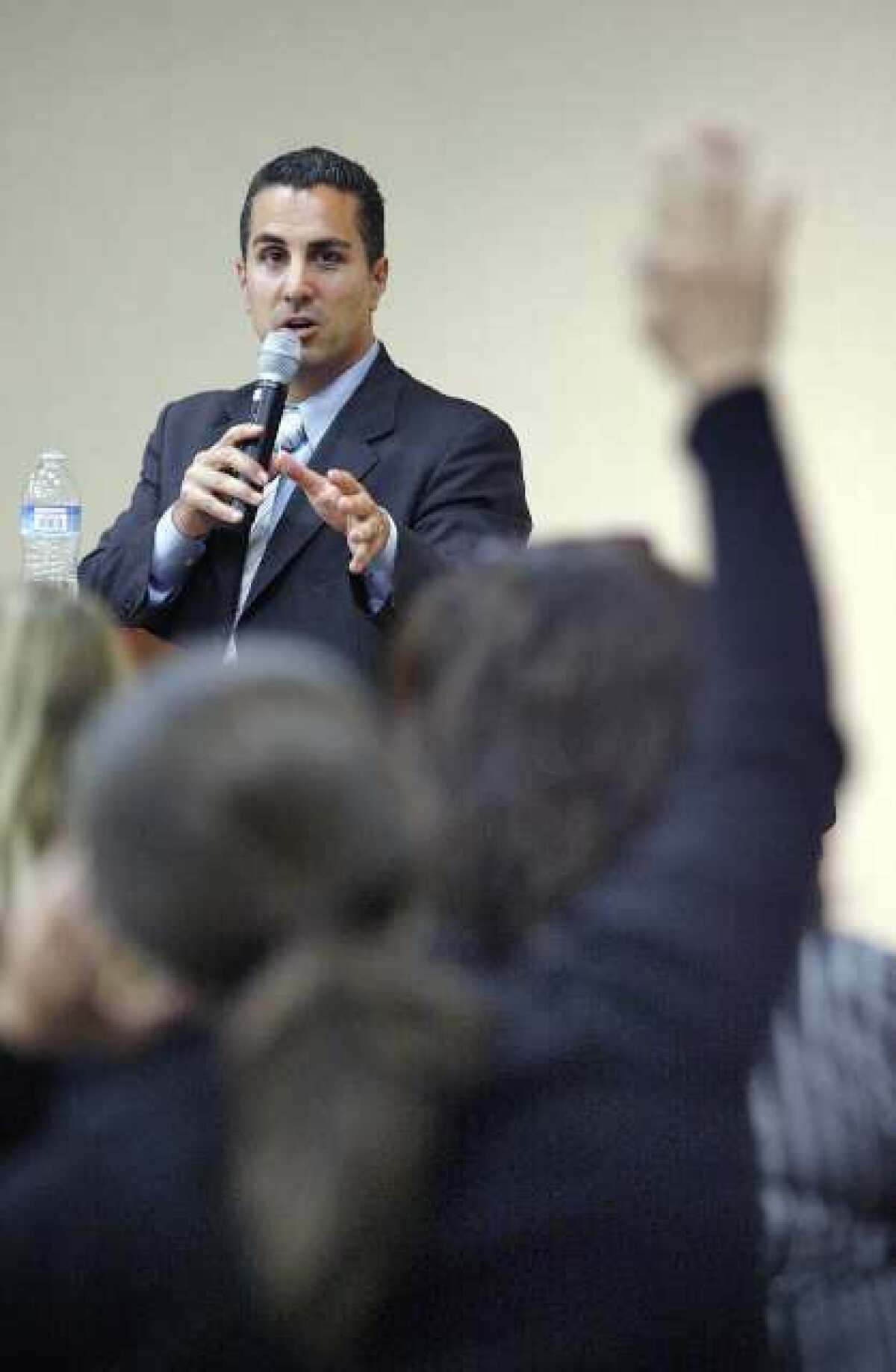Assemblymen follow divergent paths

- Share via
In politics, the trajectory of an elected official can depend on not only how they interact with their constituents, but how they get along with their peers.
And perhaps nowhere is that more apparent than the paths taken by two local assemblymen — Mike Gatto (D-Silver Lake) and outgoing Anthony Portantino (D-La Cañada Flintridge), who will be termed out of office at year’s end.
In just two years, Gatto has risen through the ranks to assume the powerful chairmanship of the Assembly Appropriations Committee largely by sticking with the party agenda on high-profile issues — despite what his constituents back home lobbied for, particularly in terms of redevelopment revenues.
This is Gatto’s second prime position in the Assembly. House Speaker John Perez, who appointed Gatto chairman of the Appropriations Committee, had previously named him Assistant Speaker Pro Tempore.
On the flip side, Portantino saw his office pummeled by his own party, particularly Perez, when he bucked the leadership agenda.
“I think the contrast between Gatto and Portantino is a fascinating one,” said Dan Schnur, director of the Jesse M. Unruh Institute of Politics at USC.
“The two have taken almost completely different approaches to the roles and obligations of a state legislator,” he said. “Which approach you think is the better one is entirely in the eye of the beholder.”
As chairman of the Appropriations Committee, Gatto is in one of the most powerful positions in the state Legislature because it sees every bill that deals with spending.
“You get a job like that by being a loyal soldier,” Schnur said. “In the capitol, they put a big premium on loyalty and the fact that Gatto stood with the leadership — even on some pretty contentious issues — makes him someone who the speaker looks at as a reliable ally.”
Gatto said he feels “primarily lucky” for his quick rise in the Democratic party.
“I’ve always just believed you should work hard and be kind to everybody and the rest will sort of work itself out,” he said.
He also said that he has voted against his party’s stance several times including his opposition to SB 202, which postponed a vote on whether to amend the California Constitution to strengthen the state’s rainy day fund and he voted against several measures that tried to lessen the oversight of voting procedures.
Schnur said Perez could have also recognized that Gatto had a tough campaign struggle to become an assemblyman, having to win four elections in 2010 — a special election, primary, run-off and general election — to attain the seat for a full term, Schnur said.
“[The Appropriations chairman] is such a powerful position,” he said. “The person who has it is situated very well to raise a lot of money for their next election.”
So far, Gatto has $456,000 in his campaign war chest going into the November election for the 43rd District, where he will face Republican challenger and Glendale Unified school board member Greg Krikorian, who had about $67,000 in cash on hand, according to the latest state filings.
The difference in approach between Portantino and Gatto was clear during the statewide fight over local redevelopment, which Gov. Jerry Brown and the Legislature eventually killed in order to use the property tax revenues to help close a massive state budget deficit.
Cities across the state, particularly Glendale and Pasadena, fought the move tooth and nail.
Portantino, a former mayor of La Cañada and member of its City Council, said cities such as Burbank, Glendale and others throughout the San Gabriel Valley were the “good actors” in terms of tapping the powers of redevelopment.
“All of those were the cities that did it right,” Portantino said, adding that he didn’t want to see those communities lose millions in redevelopment funds that help pay for important projects that drive revenues for cities.
Gatto said redevelopment needed to be eliminated, so it could undergo an overhaul.
“I think redevelopment is and always has been a subsidiary for wealthy developers at the expense of education,” he said.
He added that redevelopment needed to be “fixed to do away with the worst abuses.” He acknowledged, though, that some positive projects were also impacted.
Gatto expects a revised form of redevelopment will come before lawmakers next year “in a different name and much better form.”
Portantino, who had his office budget slashed after becoming the only Democrat not to vote in favor of his party’s budget in 2011, said he experienced retaliation due to some of his stances even before the budget vote.
After he didn’t vote to suspend the Proposition 98 school-funding guarantee in October 2010, he was removed as chairman of the Revenue and Taxation Committee.
After not supporting the budget in June 2011, Portantino received a letter nine days later, telling him he was over budget and that his staff would be furloughed without pay for 40 days.
At the time, Perez said the actions were taken because Portantino had overspent his budget.
Eventually Perez changed his mind about the furloughs, but Portantino said his budget keeps getting cut — it was reduced another $50,000 this year.
Last year, Portantino fought for more finance openness among state lawmakers and introduced a bill last August that would force the Legislature to disclose the financial records of all its members.
A few days later, the Legislature released some spending records for lawmakers.
Schnur said Gatto and Portantino are both good lawmakers, they just sometimes do their jobs in different ways and probably appeal to two different types of voters.
“If you believe that the legislative process is working the way it’s supposed to, then an approach like Gatto’s can pay off — not only for the member, but for the district,” Schnur said. “If you think the process is broken and you need a more dramatic overhaul, then you want a guy like Portantino leading the charge for change.”
